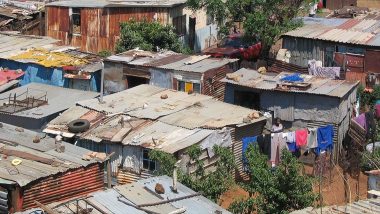Despite 25 years of the end of apartheid, serious inequalities still exist in South Africa’s economy. It is most starkly evident in the way land and resources are still owned in the country.
In 1994, at the end of apartheid, almost 90 percent of the land in South Africa was owned by white South Africans, who make up less than 10 percent of the population. Agricultural land ownership by race today is 72 per cent of farms and agricultural holdings owned by whites, 15 per cent by coloured citizens, 5 per cent by Indians, and 4 per cent by Africans.
Even the World Bank has observed, “South Africa’s historical, highly skewed distribution of land and productive assets is a source of inequality and social fragility.” It argues that, after skills, current distribution of land is the second-biggest constraint to poverty reduction and shared prosperity.
South Africa faces this disparity due to its long history of colonial conquest and dispossession that pushed the black majority population into crowded urban townships and rural reserves. The 1913 Native Lands Act made it illegal for Africans to acquire land outside of these reserves, which became known as "homelands".
To address this inequality, multiple South African governments have considered land reform and redistribution as a way to address it. Earlier this year in February, South African lawmakers overwhelmingly voted in favor to amend the constitution to allow land expropriation without compensation.
Since the end of apartheid in 1994, the ANC has followed a "willing-seller, willing-buyer" model, under which the government buys white-owned farms for redistribution to blacks.
However, the proposal on expropriation without compensation is one element of a broader programme of land reform that seeks to ensure that all citizens can have their land rights recognised, whether they live in communal areas, informal settlements or on commercial farms. The government has also included in its proposal appropriation of land for instance, unused land, derelict buildings, purely speculative land holdings, or circumstances where occupiers have strong historical rights and title holders do not occupy or use their land, such as labour tenancy, informal settlements and abandoned inner-city buildings.
President Cyril Ramaphosa has stated that land reform will follow the rule of law, and that its implementation must not adversely affect economic growth or food security. Reform will hence likely incorporate both the “release” of public or tribal trust land for redistribution, as well as “expropriation” without compensation from private individuals.
What Does Donald Trump Get Wrong about South Africa’s Land Reform
President Trump tweeted on August 22 that he has directed U.S. Secretary of State Mike Pompeo to “closely study the South Africa land and farm seizures” and the “large scale killing of farmers.” In his tweet, the president quoted Fox News host Tucker Carlson that “South African government is now seizing land from white farmers.”
‘Killing of white farmers’ is a phrase used by groups in South Africa to show that they are an increasingly prosecuted community as well as to discredit the government’s efforts for land reform in the country. The narrative of widespread killing of white farmers is used by AfriForum, a predominately white South African lobbying organization opposed to land reform, to garner international support. Members of this group were recently in the U.S. and also met with Conservative think tanks who are willing to support them. Trump’s tweet came after a TV journalist with Fox News paraded this race-driven story after he had interviewed a senior policy analyst at a conservative Washington think tank.
It is true that after the end of apartheid, there began a series of attacks on white farmers in rural South Africa as a form of revenge for the decades of racial inequality meted out. But these attacks also stemmed from the extreme inequality that the black population was still suffering under as South Africa charted a new path.
However, according to a report by agricultural industry body AgriSA‚ titled “Farm Attacks: One of Agriculture’s Challenges”‚ farm murders are at their lowest in the last 19 years. In the report they used the police crime statistics that showed 47 people were murdered on farms in 2017/18 and there were 561 farm attacks.
The number of recent farm attacks has almost halved from the highest recorded number of attacks in a single year which was 1‚069 in 2001/02. In total there have been 1‚733 murders on farms and 12‚567 farm attacks over the past 19 years.
South Africa’s land reform is hence needed and has been advocated by international organisations to ensure the country can create a stable economy that can cater to its growing population as well as address historical injustices.
(The above story first appeared on LatestLY on Aug 24, 2018 03:12 AM IST. For more news and updates on politics, world, sports, entertainment and lifestyle, log on to our website latestly.com).













 Quickly
Quickly


